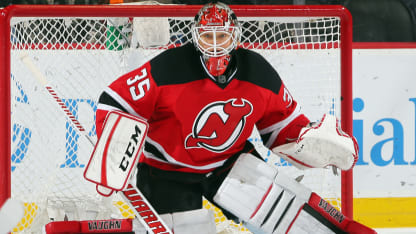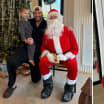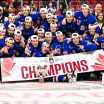VANCOUVER -- New Jersey Devils goalie Cory Schneider is completely recovered from surgery to repair a core muscle injury on May 12, and he isn't worried it delayed his normal summer training routine for a season which starts earlier than normal for him at the World Cup of Hockey 2016.
Schneider thinks being part of Team USA will help him make up lost time.
Cory Schneider ready to help Team USA in World Cup
Devils goalie healthy after offseason surgery, training for tournament

© Bruce Bennett/Getty Images
By
Kevin Woodley
NHL.com Independent Correspondent
"Surgery pushed me back a little, but honestly I think having the World Cup sooner was a good thing because once I was cleared and felt good to go, I started pushing pretty hard," Schneider said. "Not only to test the groin and make sure it's where it needed to be and [that] we didn't need to do anything else, but to get ready for the World Cup, too. So it's been a good, focused summer in terms of not only rehabbing, but keeping in mind that you have to be in game shape a little sooner than normal because you don't have as long a training camp to ease into it."
Schneider was one of three goalies named to the initial Team USA roster on March 2, along with Ben Bishop of the Tampa Bay Lightning and Jonathan Quick of the Los Angeles Kings, but a sprained MCL in his right knee forced him to miss some time shortly after the announcement. He returned to play three games for the Devils in April, and had surgery a month later.
"Sometimes you have a few bumps and bruises or injuries that don't require any further action but they do require rest to heal," Schneider said. "So I took that time off completely and unfortunately it didn't seem to improve at all. So we dug a little further and by the time you run extra tests, and get second and third opinions and schedule surgery, it takes a few weeks. So the soonest I could get in was early May and that's usually when I might start getting back into the gym."
Because it was a minor procedure, Schneider, who was 27-25-6 with a 2.15 goals-against average and a .924 save percentage in 58 games last season, said he was able to get in light work by the end of May and has been on the ice since the middle of July. The focus now is making sure he's ready when the U.S. opens training camp at Nationwide Arena in Columbus on Sept. 5. With a pre-tournament game against Team Canada four days later, the challenge will be as much mental as physical.
"That's part of the challenge," said Schneider, who works with Boston College strength coach Russ DeRosa. "Even though I was working out, you can't quite squat with a bad groin or if it is still sore so that got pushed back. It's a fine line talking with my strength coach and trying to figure out the pace and I am still in a strength mode because of the surgery, but it's not just the tournament. It's 82 games and hopefully more after that I need to prepare for."
Team USA will play three exhibition games before the start of the two-week tournament, which runs from Sept. 17 to Oct. 1 at Air Canada Centre in Toronto. Team USA is in Group A with Team Canada, Team Czech Republic and Team Europe (players from European countries other than Russia, Finland, Sweden and the Czech Republic).
The top two finishers from Group A and Group B (Team Russia, Team Sweden, Team Finland and Team North America (players from Canada and the United States who are 23 or under as of Oct. 1, 2016) advance to the semifinals. The semifinal winners will play in a best-of-3 Final starting Sept. 27. All games will be broadcast by ESPN in the United States, and Sportsnet and TVA Sports in Canada.
"Just getting that intensity level and compete level to where it needs to be is going to be is the biggest challenge because you have to get to a playoff like intensity, rabid crowds, in a matter of a week or two," Schneider said. "When you play in the Olympics guys are in midseason form and they have it already, but for this tournament we all have to find a way to come in with an intensity and focus you normally don't have at the beginning of September."
Schneider also has to make sure he is ready for the pace of World Cup practices right away, which not only means facing some of the NHL's best shooters from close range, but also being able to go post-to-post in a hurry and get fully extended when needed. Schneider had help from his long-time personal goaltending coach Brian D'Accord of Stop It Goaltending, located outside of Boston.
Often working alongside fellow Stop It alumni like Scott Darling of the Chicago Blackhawks and Mike Condon of the Montreal Canadiens, the focus starts with dialing in controlled movements and trying out new techniques before moving into a more dynamic environment.
"I work with Brian exclusively during first part of summer just to make sure I have my legs under me and I am not going to get backdoored too soon," Schneider said.
In late August, goalies take part in bigger skates with more players that closely resemble an NHL practice. There is often a scrimmage, and that's where Schneider needs to find another level before U.S. training camp.
"The next step is getting out there and just trying to push myself and treat it like a game and take as many reps as I can," Schneider said. "After two or three straight days of intense on-ice stuff at training camp your groin can get sore and your hips can get sore but with this camp you can't afford to take a day off or have to pull back because you are adjusting to the intensity. You have to try to replicate that beforehand and it's my job to do that."
Official PrimeSport World Cup of Hockey Packages

















